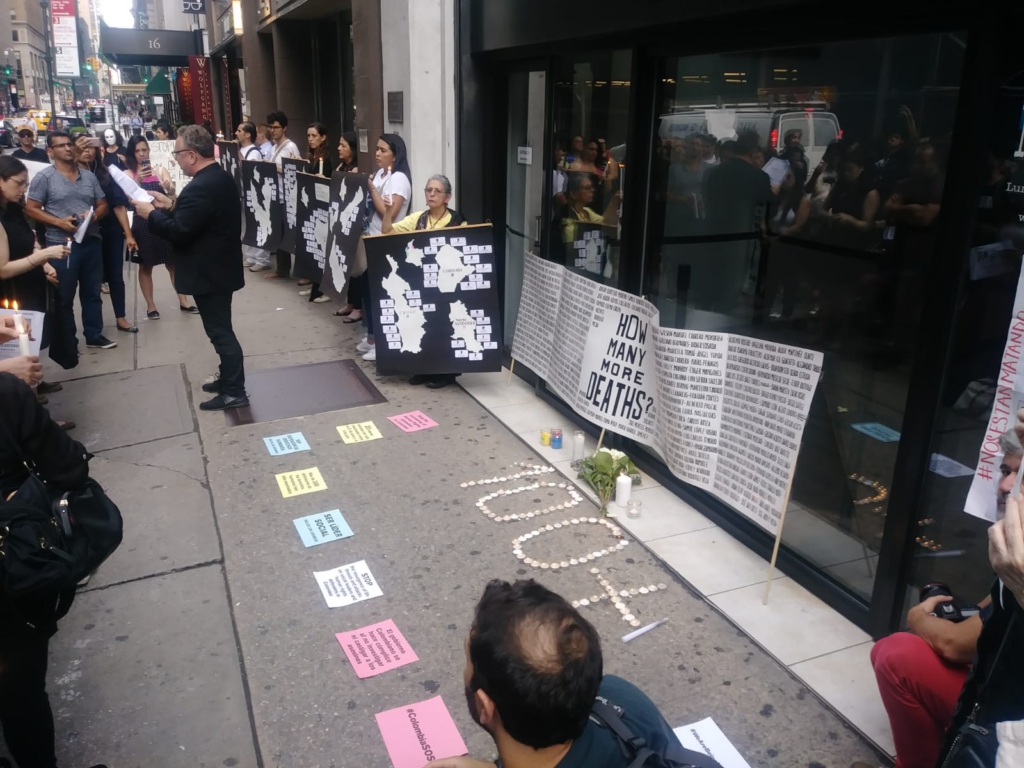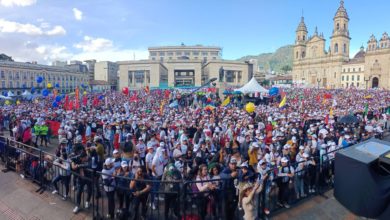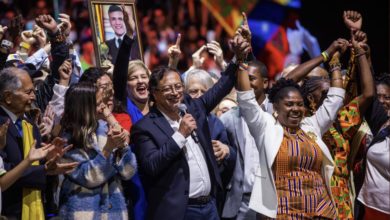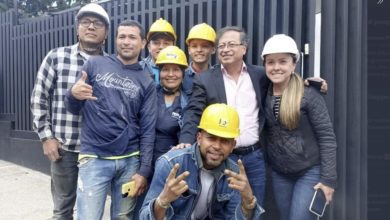On July 6, after a sharp increase in assassinations of human rights leaders in Colombia, thousands of people in Colombia, the Colombian diaspora, and others across the world, united in vigils demanding the immediate cease of the relentless prosecution of members of human rights and political organizations and social movements in Colombia.
They also demanded that the Colombian government honor the peace agreement it signed with the FARC-EP (Revolutionary Armed Forces of Colombia—People’s Army) in Dec. 2016.
“Gustavo Petro became the first leftist candidate to live to see the second round of presidential elections in the history of Colombia,” stated Ramiro, one of the lead organizers in the New York City vigil. This was an important an accomplishment in the current repressive atmosphere in Colombia, even though Petro did not win.

The NYC vigil was attended by roughly 100 people, most of whom were people of Colombian descent living here. They first gathered around the Colombian Consulate, where they lit candles and held up the images of those human rights leaders that had been assassinated. They marched to the Simon Bolivar statue in Central Park where different individuals read out loud the names of the more than 300 social and political leaders that are no longer living.
300 human rights defenders assassinated
The 2016 peace agreement brought an end to a 53-year civil war between the Colombian government and the FACR-EP, and outlined six essential points: ceasefire and disarmament, justice for victims, rural reforms, political participation, illicit crops, and the process of implementation.
After the peace agreement was signed, social and political organizations witnessed an upsurge in armed persecution. This has occurred even though the peace agreement guarantees Colombians freedom to engage in opposition politics without being targeted by paramilitaries, the state military, and the criminal “injustice” system.
Since the signing of the peace accords, over 300 human rights defenders have been assassinated, according to INDEPAZ (Instituto de Estudios para el Desarrollo y la Paz). In the last month, the number of politically-motivated homicides rose to 20, and seven of those occurred just on July 3 in the municipality of Algeria.
Many believe the intensification of the political prosecution is a result of the election of Iván Duque as president on June 17. Duque is the successor of Álvaro Uribe Vélez, president of Colombia from 2002- 2010, and currently serving as a senator. Uribe is the personification of ultraright politics in the region. He is currently the subject of more than 200 investigations for numerous crimes including creating the rightwing terrorist paramilitary groups responsible for several massacres of innocent people in Colombia. The election’s reinforcement of ultraright political power gives rightwing terrorist groups the confidence that they can carry out massacres without reprisals.
In fact, these rightwing paramilitary groups have threatened and killed not only human rights leaders, but also those who support the peace process, educators, and even those who were in involved in Gustavo Petro’s Colombia Humana progressive political movement. Passing out flyers to entire communities, mailing letters to people’s homes, making home visits, or making threatening phone calls to organizers are just some of the practices used by paramilitaries to disseminate death threats.
Moreover, these forces continue to sabotage the peace agreements by punishing one of the lead FARC negotiators, Jesus Santrich. Unsubstantiated charges have been filed against him which may lead to his extradition to the U.S.
US opposition to peace process emboldens rightwing
Since the Obama administration, the United States has not supported the peace accords and has aligned itself with far right political leaders who advocated for violent eradication and “fumigation” programs which led to the massacre of 15 campesinos in Tumaco, Colombia, in Oct. 2017.
The U.S. has refused to free Colombian political prisoners held in the United States. For example, Simon Trinidad still remains in a U.S. prison, even though his freedom was stipulated in the peace agreements.
All progressive and revolutionary people should stand in solidarity with all those advocating the immediate end to the political persecution of human rights, social and political leaders in Colombia. We demand that both the Colombian and U.S. government abide by what was agreed to in the Peace Accords.





